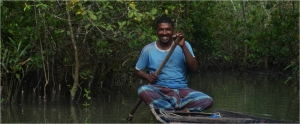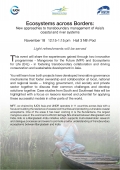Ecosystems across Borders: MFF at the World Parks Congress 2014
MFF co-hosts congress side event on new approaches to transboundary management of Asia's coastal and river systems
Location: Sydney, Australia. 18th Nov 2014
The Congress side event shared the experiences gained through the innovative approach of multi-country partnership between Mangroves for the Future (MFF) and Ecosystems for Life (E4L) - in fostering transboundary collaboration and driving conservation and sustainable development in Asia. Drawing on the experiences of both MFF and E4L, case studies were presented to show the ways in which innovative governance mechanisms have helped to bring about positive policy changes to support conservation and meet development goals.
"There is limited opportunity to expand formal Protected Areas to achieve the Aichi Target 11 considering the large population of Asia," IUCN Asia Regional Director Aban Marker Kabraji said in her introductory speech. "Effective area-based conservation measures, integrated into the wider landscape and seascape, are becoming increasingly important to fulfill the Aichi Target in Asia.
The Aichi Target 11 states that by 2020, at least 17% of the terrestrial and inland water areas and 10% of coastal and marine areas, especially areas of particular importance for biodiversity and ecosystem services, are conserved through effectively and equitably managed, ecologically representative, and well-connected systems of protected areas. "Together with Aichi Target 15, which talks about achieving ecosystem resilience and restoration of at least 15% of degraded ecosystems, requires us to act on innovative approaches in managing buffer zones, production landscape and large ecosystems beyond the borders of Protected Areas," continued Mrs Marker Kabraji.
The IUCN Regional Director emphasized, "Governance is an absolute element for building ecosystem resilience and achieving targets for restoration of degraded ecosystems in and beyond Protected Areas. Governance at a regional scale, to foster cooperation beyond national borders, is needed for large and transboundary ecosystems management."
Dr Steen Christensen, Coordinator of MFF, agreed with Mrs Marker Kabraji in his presentation of the MFF program. Dr Christensen said, "From starting out as a tsunami recovery response programme, MFF has now transformed into a resilience building initiative across 11 countries in Asia. The MFF governance structure brings together government civil society and private sector together to take actions at the national level, and cooperate at the regional scale to act together in a large part of Asia's vast coastal areas."
The MFF Coordinator mentioned that this unique partnership of diverse stakeholders across countries facilitates the knowledge sharing and provides opportunities for transboundary cooperation at the regional level.
Dr Christensen cited an example of how MFF allows cross-sectoral cooperation to develop policy solutions for coastal ecosystem management. "In Xuan Thuy National Park, Viet Nam, MFF influenced the development of a community inclusive co-management system, linked with a payment for ecosystem service as a finance mechanism. As a result, National Park managers are now working with community women on natural resource access in the Park. More importantly, the community women were empowered to participate in making decisions about resource use in Xuan Thuy National Park."
MFF has been supporting national partners facilitate dialogues to develop a network of marine protected areas (MPAs) in Viet Nam."It was all possible thanks to the national governance structure that drives MFF operations in a country," Dr Christensen added. In Sri Lanka and India, MFF has also brought governments and partners to work on Gulf of Mannar conservation.
"The success of MFF was possible due to a strong national ownership and flexibility that the MFF governance structure has," IUCN Deputy Regional Director, Dr TP Singh, pointed out. "MFF allows for a diverse range of partners to work together. Similarly, Ecosystems for Life (E4L) is a Bangladesh-India initiative that supports multi-stakeholder research and dialogue processes ,and promotes a better understanding of transboundary river ecosystems between Bangladesh and India."
Dr Brian Furze, IUCN Project Director for E4L, added, "Multi-stakeholder partnerships can bind culture, science, policy and governance that result in saving a species such as the Hilsha river fish in Bangladesh, and eventually the ecosystem."
Fostering cooperation beyond national borders influence decisions for managing large ecosystems. Dr Singh summarized, "IUCN Asia has presented two great examples of new way of thinking that connects people across sectors: civil society, government, and private sector. The success of both MFF and E4L lies with the ability to create partnership."
At the end of the side event, participants learned how both projects developed innovative governance mechanisms that foster ownership and collaboration at local, national and regional levels -- bringing government, civil society and private sector together to discuss their common challenges and develop solutions together.
The side event contributes to the stream on "enhancing diversity and quality of governance". It also relates to the stream on “responding to climate change” and to the Marine and World Heritage cross-cutting themes.
There was also a statement made at World Parks Congress by the IUCN Mangroves Specialist Group which proposed concrete actions to protect, restore and expand mangrove protected areas. The work presented by the Mangrove Specialist Group is in line with MFF's Call for Action on Regional Mangrove Restoration, also proposed to conserve and restore mangroves and halt their further loss and degradation. MFF's Call for Action is a result of a regional colloquium on sharing lessons in mangrove restoration held in Tamil Nadu, India on August 2012. Further collaboration between MFF and the IUCN Mangrove Specialist Group will be pursued.
About Mangroves for the Future (MFF) and Ecosystems for Life (E4L)
MFF, co-chaired by IUCN Asia and UNDP, operates in 11 countries across Asia with a focus on building the resilience of coastal communities and protecting vulnerable coastal ecosystems. One of the areas it has been working in is the Sundarbans, the largest mangrove area in the world and a World Heritage Site shared between Bangladesh and India. E4L is a Bangladesh-India initiative which supports multi-stakeholder research and dialogue processes and seeks to promote a better understanding of transboundary ecosystems between Bangladesh and India.
Both the MFF and E4L programmes place considerable emphasis on governance mechanisms that promote local to national and trans-national practice and policy learning. Both programmes facilitate innovations in the way in which decisions are made, thereby leading to net positive changes in both livelihoods and ecosystems.
MFF has a unique governance model involving stakeholders from government, civil society and the private sector, who take decisions about the provision of grants for field-level projects. This governance structure, in turn, enables lessons from the field to influence policy at the national level. The MFF model has now been demonstrated in most coastal areas stretching from Indonesia to Pakistan. E4L, on the other hand, uses research and civil society to civil society dialogues to influence policy on transboundary ecosystems.
For more information, visit the IUCN World Parks Congress website.

People thrive in healthy ecosystems., Bangladesh © IUCN, 2014
Related Images
Related Documents

Ecosystem across Borders
New approaches to transboundary management of Asia’s coastal and river systems
Author: IUCN
Publisher: IUCN
Posted on: 12th Nov 2014
Category: Asia Region (Secretariat)
Size: 953 KB
